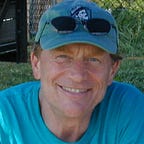Full Mastery of the Impinging Moment
“I am finding that life here has become largely a life of the mind. Unhurried reflection is a sort of companion. Yes, solitude is greater than I anticipated. My sense of values is changing, and many things which before were in solution in my mind now seem to be crystallizing. I am better able to tell what in the world is wheat for me and what is chaff.”
These days, most of us are looking around for any guidance or perspective to move through a situation we have never seen. One place I found myself searching was in my notes from various readings over the years of Admiral Richard E. Byrd’s Alone, the account of his 1934 solo scientific research project and near-death in the Antarctic and the source of the above quote.
The afterword of my copy notes that Byrd’s name has slipped off the general public’s radar screen over the decades and has certainly diminished in prominence compared to his contemporaries. Mention of Charles Lindbergh or Amelia Earhart will likely elicit nods of recognition; mention of Babe Ruth or Greta Garbo will certainly do so. At his peak, Byrd was as famous any of these now lionized figures, but today his name might spark no more than an uncertain look, a vague memory from a sixth grade history class.
He lived for months in solitude in a hut under the ice, doing weather experiments and communicating with the main base, many days’ journey away in those days, by radio. He nearly died, alone in isolation, and his journal of the six months provided the basis for the book.
But he left better able to tell what was wheat to him and what was chaff. There are lessons to be learned in times of solitude and reflection.
He writes–
Nevertheless I practiced my preachments of a disciplined mind. Or perhaps discipline isn’t exactly the right word; for what I did, or tried to do, was to focus my thinking on healthy, constructive images and concepts and thus crowd out the unhealthy ones. I built a wall between myself and the past in an effort to extract every ounce of diversion and creativeness inherent in my immediate surroundings.
Every day I experimented with new schemes for increasing the content of the hours. “A grateful environment,” according to Santayana, “is a substitute for happiness,” for it can stimulate us from without just as good works can stimulate us from within. My environment was intrinsically treacherous and difficult, but I saw ways to make it agreeable. I tried to cook more rapidly, take weather and auroral observations more expertly, and do routine things systematically. Full mastery of the impinging moment was my goal. I lengthened my walks and did more reading, and kept my thoughts upon an impersonal plane. In other words, I tried resolutely to attend to my business.
After the stove accident which caused the poisoning, his journal said, “Across the room in the shadows beyond the reach of the storm lantern, were rows of books, many of them great books, preserving the distillates of profound lives. But I could not read them. The pain in my eyes would not let me.”
The world learned later that the pain in his eyes was from carbon monoxide poisoning. “Could I but read,” he wrote, “the hours would not seem half so long, the darkness half so oppressive, and my minor misfortunes half so formidable.”
What a paean to reading and to the lessons available from profound lives. His book would become the same kind of inspirational distillate for later generations.
